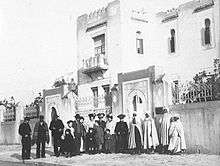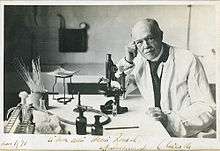Pasteur Institute of Tunis
The Pasteur Institute of Tunis (Arabic: معهد باستور بتونس), located in Tunis, Tunisia is one of the main research centers of the International Network of Institutes Pasteur.
History
Foundation


Founded in 1893,[1] it was originally a modest laboratory, located rue des Tanneurs in Tunis, which deals with winemaking and diseases of the vine. Charles Nicolle, a pasteurian and doctor of medicine from Rouen, comes to Tunis to look for work. A credit is then opened by the Directorate of Agriculture to create a large laboratory. He chooses the location and sees to the construction of what becomes the Pasteur Institute of Tunis, on the plans of Raphael Guy. Charles Nicolle was seconded by doctors from Tunis at the time, including Ernest Conseil, Adrien Loir and biologist and veterinarian Lucien Balozet, deputy director of the Institute from 1929.
Nobel Prize for Charles Nicolle
Nicolle is rewarded for his discoveries by the Nobel Prize in Physiology or Medicine in 1928 and the Pasteur Institute is honored on this occasion.[2] Nobel Prize in Physiology or Medicine in 1928 and the Institut Pasteur is honored on this occasion.
Attempt to attach to France
A few years after the death of Charles Nicolle in 1936, his collaborators compete to take control of the institution. Jean Mons, General Resident of France in Tunisia ended up imposing Lucien Balozet, who was acting director from 1943 to 1949, with the aim of removing from Tunisia an important institution, which must become "dependent on the Pasteur Institute of Paris which agrees to take charge of senior technical management, administration and recruitment of staff of all categories ". Moreover, "the Tunisian government undertakes to pay the annual sum of nine million francs, and the land and buildings currently occupied or under construction will be allocated free of charge to the Pasteur Institute in Paris".Dr. Ahmed Ben Miled then leads a campaign in the Tunisian and French newspapers against this measure.[3]
Directors
Below is a list of directors:
- 1893–1902 : Adrien Loir[4]
- 1902–1936 : Charles Nicolle[5]
- 1936–1943 : Étienne Burnet[6]
- 1943–1949 : Lucien Balozet (intérim)[7]
- 1949–1954 : Paul Durand[8]
- 1954–1960 : Gérard Renoux
- 1960–1962 : Jean Levaditi[9]
- 1963–1988 : Amor Chadli
- 1988–2005 : Koussay Dellagi
- 2005–2007 : Abdeladhim Ben Abdeladhim
- depuis 2007 : Hechmi Louzir
References
- Jean-Pierre Dedet (2000). Les Instituts Pasteur d'outre-mer (in French). Paris: L'Harmattan. p. 70. ISBN 9782738499004.
- "Comment Charles Nicolle a ramené à la Tunisie le premier Prix Nobel". leaders.com.tn (in French). 16 July 2013. Retrieved 24 January 2018.
- En 1994, le docteur Ahmed Ben Miled reçoit une médaille pour " services très éminents " rendus à l'Institut Pasteur de Tunis.
- "Adrien Loir (1862–1941)". webext.pasteur.fr (in French). Retrieved 4 June 2017.
- "Charles Nicolle (1866–1936)". webext.pasteur.fr (in French). Retrieved 4 June 2017.
- "Étienne Burnet (1873–1960)". webext.pasteur.fr (in French). Retrieved 4 June 2017.
- "Lucien Balozet (1892–1972)". webext.pasteur.fr (in French). Retrieved 4 June 2017.
- "Paul Durand (1886–1960)". webext.pasteur.fr (in French). Retrieved 4 June 2017.
- "Jean Levaditi (1906–1991)". webext.pasteur.fr (in French). Retrieved 4 June 2017.